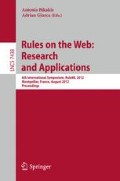Abstract
We propose a Parallel Class Expression Learning algorithm that is inspired by the OWL Class Expression Learner (OCEL) and its extension – Class Expression Learning for Ontology Engineering (CELOE) – proposed by Lehmann et al. in the DL-Learner framework. Our algorithm separates the computation of partial definitions from the aggregation of those solutions to an overall complete definition, which lends itself to parallelisation. Our algorithm is implemented based on the DL-Learner infrastructure and evaluated using a selection of datasets that have been used in other ILP systems. It is shown that the proposed algorithm is suitable for learning problems that can only be solved by complex (long) definitions. Our approach is part of an ontology-based abnormality detection framework that is developed to be used in smart homes.
Access this chapter
Tax calculation will be finalised at checkout
Purchases are for personal use only
Preview
Unable to display preview. Download preview PDF.
References
McGuinness, D., Van Harmelen, F., et al.: OWL web ontology language overview. W3C Recommendation 10, (2004) 2004–03
Tran, A.C., Marsland, S., Dietrich, J., Guesgen, H.W., Lyons, P.: Use Cases for Abnormal Behaviour Detection in Smart Homes. In: Lee, Y., Bien, Z.Z., Mokhtari, M., Kim, J.T., Park, M., Kim, J., Lee, H., Khalil, I. (eds.) ICOST 2010. LNCS, vol. 6159, pp. 144–151. Springer, Heidelberg (2010)
Hellmann, S., Lehmann, J., Auer, S.: Learning of OWL class descriptions on very large knowledge bases. Int. J. Semantic Web Inf. Syst. 5(2), 25–48 (2009)
Lehmann, J.: DL-Learner: learning concepts in description logics. The Journal of Machine Learning Research 10, 2639–2642 (2009)
Ghemawat, S., Dean, J.: Mapreduce: Simplified data processing on large clusters. In: Symposium on Operating System Design and Implementation, OSDI 2004, San Francisco, CA, USA (2004)
Zilberstein, S.: Using anytime algorithms in intelligent systems. AI Magazine 17(3), 73–83 (1996)
Muggleton, S.: Inductive logic programming. New Generation Computing 8(4), 295–318 (1991)
d’Amato, C., Fanizzi, N., Esposito, F.: Inductive learning for the semantic web: What does it buy? Semantic Web 1(1), 53–59 (2010)
Lavrac, N., Dzeroski, S.: Inductive Logic Programming: Techniques and Applications. Ellis Horwood, New York (1994)
Zelle, J.M., Mooney, R.J., Konvisser, J.B.: Combining top-down and bottom-up techniques in inductive logic programming. In: Proceedings of the 11th International Conference on Machine Learning, pp. 343–351 (1994)
Lisi, F.A.: Building rules on top of ontologies for the semantic web with inductive logic programming. Theory and Practice of Logic Programming 8(3), 271–300 (2008)
Cohen, W., Hirsh, H.: Learning the classic description logic: Theoretical and experimental results. In: Proceedings of the 4th International Conference on Principles of Knowledge Representation and Reasoning, Citeseer, pp. 121–133 (1994)
Iannone, L., Palmisano, I.: An Algorithm Based on Counterfactuals for Concept Learning in the Semantic Web. In: Ali, M., Esposito, F. (eds.) IEA/AIE 2005. LNCS (LNAI), vol. 3533, pp. 370–379. Springer, Heidelberg (2005)
Fanizzi, N., d’Amato, C., Esposito, F.: DL-FOIL Concept Learning in Description Logics. In: Železný, F., Lavrač, N. (eds.) ILP 2008. LNCS (LNAI), vol. 5194, pp. 107–121. Springer, Heidelberg (2008)
Lehmann, J., Hitzler, P.: Concept learning in description logics using refinement operators. Machine Learning 78(1), 203–250 (2010)
Cormen, T.: Introduction to algorithms. The MIT Press (2001)
Lehmann, J., Auer, S., Tramp, S., et al.: Class expression learning for ontology engineering. In: Web Semantics: Science, Services and Agents on the World Wide Web (2011)
Sirin, E., Parsia, B., Grau, B., Kalyanpur, A., Katz, Y.: Pellet: A practical owl-dl reasoner. Web Semantics: Science, Services and Agents on the World Wide Web 5(2), 51–53 (2007)
Fahnrich, K., Lehmann, J., Hellmann, S.: Comparison of concept learning algorithms (2008)
Železný, F., Srinivasan, A., Page, D.L.: Lattice-Search Runtime Distributions May Be Heavy-Tailed. In: Matwin, S., Sammut, C. (eds.) ILP 2002. LNCS (LNAI), vol. 2583, pp. 333–345. Springer, Heidelberg (2003)
Author information
Authors and Affiliations
Editor information
Editors and Affiliations
Rights and permissions
Copyright information
© 2012 Springer-Verlag Berlin Heidelberg
About this paper
Cite this paper
Tran, A.C., Dietrich, J., Guesgen, H.W., Marsland, S. (2012). An Approach to Parallel Class Expression Learning. In: Bikakis, A., Giurca, A. (eds) Rules on the Web: Research and Applications. RuleML 2012. Lecture Notes in Computer Science, vol 7438. Springer, Berlin, Heidelberg. https://doi.org/10.1007/978-3-642-32689-9_25
Download citation
DOI: https://doi.org/10.1007/978-3-642-32689-9_25
Publisher Name: Springer, Berlin, Heidelberg
Print ISBN: 978-3-642-32688-2
Online ISBN: 978-3-642-32689-9
eBook Packages: Computer ScienceComputer Science (R0)

